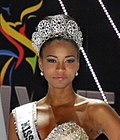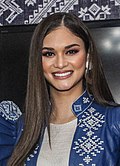Miss Universe
Annual international beauty pageant competition From Wikipedia, the free encyclopedia
Miss Universe is an annual international major beauty pageant that is run by a Thailand and Mexican-based Miss Universe Organization.[1] Along with Miss World, Miss International, and Miss Earth, it is one of the Big Four beauty pageants.[2]
| Type | International women's beauty pageant |
|---|---|
| Parent organization |
|
| Headquarters |
|
| First edition | 1952 |
| Most recent edition | 2024 |
| Current titleholder | Victoria Kjær Theilvig Denmark |
Owners |
|
CEO | Jakkaphong Jakrajutatip |
President | Raul Rocha Cantú |
Vice Presidents |
|
| Language | English |
| Website | www |
The Miss Universe Organization and its brand, is currently owned by JKN Global Group and Legacy Holding Group USA Inc., an American division of Mexican company Legacy Holding through the joint venture company JKN Legacy Inc.[3] Telemundo has the licensing rights to air the pageant through 2023.[4] The pageant's advocacy is "humanitarian issues and is a voice to affect positive change in the world."[5][6]
The current Miss Universe is Victoria Kjær Theilvig of Denmark who was crowned on November 16, 2024 in Mexico City, Mexico.
History
Summarize
Perspective

The title "Miss Universe" was first used by the International Pageant of Pulchritude in 1926. This contest was held annually until 1935, when the Great Depression and other events preceding World War II led to its demise.
The current Miss Universe pageant was founded in 1952 by Pacific Knitting Mills, a California-based clothing company and manufacturer of Catalina Swimwear, and has since been headquartered in the United States. The company was the sponsor of the Miss America pageant until 1951, when the winner, Yolande Betbeze, refused to pose for publicity pictures wearing one of their swimsuits. In 1952, Pacific Knitting Mills organized the Miss USA and Miss Universe pageants, co-sponsoring them for decades to follow.[7]

The first Miss Universe Pageant was held in Long Beach, California in 1952. It was won by Armi Kuusela from Finland, who gave up her title, though not officially, to get married shortly before her year was completed.[8] Until 1958, the Miss Universe title, like that of Miss America, was dated by the year following the contest, so at the time Kuusela's title was Miss Universe 1953. Since its founding by Pacific Mills, the pageant has been organized and conducted by the Miss Universe Organization. Eventually, Pacific Mills and its subsidiaries were acquired by the Kayser-Roth Corporation.[9]
The pageant was first televised in 1955. CBS began broadcasting the combined Miss USA and Miss Universe pageants in 1960, and as separate contests in 1965. Eventually, Gulf and Western Industries bought the Kayser-Roth Corporation in 1975 which also acquired the Miss Universe pageant until 1991 when it was bought by Procter & Gamble.[9]
In 1996, Donald Trump bought the pageant from ITT Corp, with a broadcasting arrangement with CBS until 2002.[10] During this time, in 1998, Miss Universe, Inc. changed its name to the Miss Universe Organization, and moved its headquarters from Los Angeles to New York City.[11][12] By late 2002, Trump entered into a joint venture with NBC,[1][13] which in 2003 outbid the other markets for the TV rights.[14] From 2003 to 2014, the pageant was broadcast in the United States on NBC.
In June 2015, NBC cancelled all business relationships with Trump and the Miss Universe Organization in response to controversial statements about illegal immigrants who crossed the border from Mexico.[15][16] As part of the legal settlement, in September 2015, Trump bought out NBC's 50% stake in the company, making him the company's sole owner. Three days later, he sold the whole company to WME/IMG.[17][18] Following the change of ownership, in October 2015, Fox and Azteca became the official broadcasters of the Miss Universe and Miss USA pageants.[19] The broadcast rights to the Miss Universe Pageant was temporarily split between Telemundo and FYI during the 2020 pageant. amidst COVID-19 pandemic restrictions at the time. The contract with Fox and then-emcee Steve Harvey was resumed for the 2021 edition.
On October 26, 2022, Thailand-based JKN Global Group acquired Miss Universe Organization (MUO) from Endeavor Group Holdings-owned IMG Worldwide at $14 million, making Anne Jakapong Jakrajutatip the first transgender woman to own the organization and marking the first time the organization expands its headquarters outside the U.S. From the 2022 edition onwards, NBC has re-acquired broadcast rights via The Roku Channel for the competition as a result of the ownership changes, marking the first time in Miss Universe history that the pageant has transitioned from traditional broadcast network coverage to full streaming service in the United States.[20]
On November 16, 2023, Paula Shugart, president of the Miss Universe Organization, announced her departure from the Miss Universe Organization.[21] The aforementioned position will not be replaced.[21] Following the departure of Shugart, CEO of the Miss Universe Organization Amy Emmerich also announced her departure on 8 February 2024 and left the organization on 1 March 2024.[22]
Contestant selection
Summarize
Perspective
To gain participation in Miss Universe, a country needs a local company or person to buy the local rights of the competition through a franchise fee. The fee includes the rights of image, brand and everything related to the pageant. Often the owner of the franchise returns the franchise to the Miss Universe Organization, which resells it to a new stakeholder. The reselling of the franchise from one owner to the next is recurrently common in the history of the event, sometimes for contractual breaches or financial reasons. The number of participants fluctuates annually because of the franchising of the pageant paired with conflicting schedules to the regular calendar, but has steadied above 70 countries since 1989.
Usually a country's candidate selection involves pageants in the nation's local subdivisions, where local winners compete in a national pageant, but there are some countries who opt for an internal selection. For example, from 2000 to 2004, Australian delegates were chosen by a modeling agency. Although such "castings" are generally discouraged by the Miss Universe Organization, Jennifer Hawkins was chosen to represent the country in Miss Universe in 2004 (where she would eventually win the crown). Australia would eventually reinstate its national pageant for Miss Universe from 2005 onwards.
Recent countries that debuted in the pageant include Cameroon (2020), Bahrain (2021), Bhutan (2022), Pakistan (2023), Belarus, Eritrea, Guinea, Iran, Macau, Maldives, Moldova, North Macedonia, Somalia, United Arab Emirates and Uzbekistan (2024). Macau is the latest newcomer and the most recent country to obtain its first ever semifinal placement at Miss Universe, after debuting in 2024 as a semifinalist in the Top 30.
There have been widespread speculations regarding Saudi Arabia's potential entry into the Miss Universe pageant. However, the Miss Universe Organization has officially denied these claims and dispelled any rumors regarding Saudi Arabia's participation in the contest.[23]
Meanwhile, Botswana remains the most recent first-time entry to ever win Miss Universe on its debut year (with Mpule Kwelagobe in 1999), and Denmark is the most recent country to obtain its first ever national win in Miss Universe (with Victoria Kjær Theilvig in 2024).
Cultural barriers, particularly with the swimsuit competition, and the prohibitive franchise fees of the event have prevented some countries like Mozambique from participating. Nevertheless, the Miss Universe Pageant has historically proven popular in regions like the Americas, Africa and Asia, especially in countries like United States, Philippines, Colombia, Peru, Venezuela, South Africa, France, Thailand and Indonesia, given their successful track record of multiple semifinal appearances in the last decade and combined multiple titles in the competition's history. As of 2024[update], only two countries have been present at every Miss Universe since its inception in 1952: Canada and France.[citation needed]
Since 2012, openly transgender women have been allowed to compete as long as they won their national pageants.[24] Six years after this rule went into effect, Angela Ponce of Spain became the first openly transgender candidate to compete in the contest, in the 2018[25] edition. In 2019, Myanmar's Swe Zin Htet became the first openly lesbian woman to compete in Miss Universe. Spain's Patricia Yurena Rodríguez is currently the highest-placed LGBT member at Miss Universe, placing second to Venezuela's Gabriela Isler in 2013, but did not come out until years after the competition.[26][27][28] In 2021, the Philippines' Beatrice Gomez became the first openly bisexual (and LGBT) contestant to enter the Miss Universe semifinals, after finishing as a finalist in the Top 5 that year. In 2023, Portugal's Marina Machete became the first transgender contestant to enter the Miss Universe semifinals, after finishing as a semifinalist in the Top 20.
Previously, official rules had stated that pageant contestants, "must not have ever been married, not had a marriage annulled nor given birth to, or parented a child. The titleholders are also required to remain unmarried throughout their reign."[29][30] However, in August 2022, the Miss Universe Organization announced that mothers, married, or pregnant women are eligible to compete in the pageant.[31] The new rule has been instituted since 2023. Accepting married contestants reinvigorates tension between the American-based Miss Universe pageant and the European-based Mrs. Universe pageant, which was previously the only avenue for married women to compete for the Universe title. Later that same year, Colombia's Camila Avella became the first candidate to become a mother before clinching a semifinal placement at Miss Universe, after finishing as a finalist in the Top 5.
Moreover, Miss Universe has always strictly prohibited age fabrication. While the pageant's minimum age limit has been set at 18 years old, this presents a problem for several European countries that allow 17-year-old contestants to compete in their pageants. National titleholders under 18 years of age must be replaced by their runner-up or another candidate in the main pageant. In recent years, all Miss Universe candidates have been required to be at least university degree holders or working professionals from the onset of their national pageants. In September 2023, R'Bonney Gabriel announced that the organization would be dropping the upper age limit. Previously, contestants had to be between 18 and 28 years old by the start of the pageant. Beginning in 2024, "every adult woman in the world will be eligible to compete to be Miss Universe."[32]
Main pageant
Summarize
Perspective
Throughout the history of Miss Universe, the main pageant has varied widely in terms of annual scheduling. In the last decade, the Miss Universe competition has been consistently held over a two-week period between early November and late January. Because of television schedule demands (largely as a result of international time zone differences) or conflicting national events happening during the organizing process (such as the COVID-19 pandemic, the Olympics, FIFA World Cup and national elections depending on the hosting country), four editions have been postponed to next year (as with the 2014, 2016, 2020, and 2022 editions). Since the 2022 edition held in New Orleans, United States during the 2023 calendar year, the Miss Universe Organization has regularly announced the hosting nation of the immediate next edition during the live coronation night. The next edition is scheduled for 2024 in Mexico. Between the early 1970s through the late 2000s, the pageant spans a full month (typically between March and June) to allow time for rehearsals, appearances, and the preliminary competition, with the winner being crowned by the previous year's titleholder during the final competition.
According to the organizers, the Miss Universe contest is more than a beauty pageant, though they are expected to participate in swimsuit and evening gown competitions. Women aspiring to become Miss Universe must be intelligent, well-mannered, and cultured. If a candidate is unable to perform well during each round, she is often eliminated. Normally, the placements of the candidates are determined by a ranked vote, where each judge ranks each of the candidates individually and within the stipulated rules. In the past, the pageant semifinalists were chosen on a round robin system. Between 2017 and 2019, the semifinalists were selected based on highest scores per continental group followed by the judging panel's wildcard list along an extra candidate chosen in popular choice. All preliminary results were reset and a new competition starts with the highest placed positions at the semifinals. From 2020 onwards, the round robin system was reinstated where in each round of the grand final, the group of candidates with the lowest rates are progressively eliminated. However, this criterion has been modified to use weighted averages or with points accumulated by stages from the preliminary competition to coronation night, with the assessment in ascending or descending order. From 2011 to 2014, 2016, 2020 and since 2022, the public can also select another semifinalist via fan-voting. Since the pageant's inception, all semifinalists are announced at the beginning of the live telecast regardless of the edition's format and if ties occur in the final rounds, the preliminary results are used.
The winner then signs a contract with the Miss Universe Organization that can last at least seven months to more than a full year as per demands of the Miss Universe Organization. The new Miss Universe takes office immediately after the coronation and takes on a public cause in which she becomes the ambassador for a year to spread messages about the control of diseases, peace, and public awareness of AIDS (though the organization's more recent humanitarian works have included various causes such as women's and ethnic minority rights, along with contemporary racial issues, public health issues and the consequences of global warming). The winner also receives a cash allowance for her entire reign, a New York Film Academy scholarship, a modeling portfolio, beauty products, clothes, shoes, as well as styling, healthcare, and fitness services by different sponsors of the pageant. She also gains exclusive access to events such as fashion shows and opening galas, as well as access to casting calls and modeling opportunities throughout New York City. Between 1996 and 2015, the winner was given the use of a Trump Place apartment in New York City during her reign, which she shares with the Miss USA and Miss Teen USA titleholders. Starting in 2022, the winner and the two runners-up in the Top 3 will shuffle between residences in New York, United States and Bangkok, Thailand.[33]
If the winner, for any reason, cannot fulfill her duties as Miss Universe, the first runner-up takes over. This protocol has happened only once As of 2024[update], when Panama's Justine Pasek succeeded Russia's Oxana Fedorova as Miss Universe in 2002 after the latter's dethronement later that same year.[citation needed] Aside from the main winner and her runners-up, special awards are also given to the winners of the Best National Costume, Miss Photogenic, and Miss Congeniality. The Miss Congeniality award is chosen by the delegates themselves. In recent years, Miss Photogenic has been chosen by popular internet vote (the winner used to be chosen by media personnel covering the event), and the winning country for Best National Costume is announced live after the naming of the semifinalists during finals night. Starting in 2024, Continental Queens are announced after the show that will travel with the Miss Universe winner.
Crowns of Miss Universe
Summarize
Perspective
The crown of Miss Universe has changed twelve times over the course of its 70-year history.[34]
- The Romanov Imperial Nuptial Crown (1952) was the first crown. It was previously owned by a Russian czar. It contains 1,529 flawless diamonds weighing 300 carats and was insured for US$500,000. It was used to crown Armi Kuusela in 1952.[34][35]
- The Romanov Diadem Crown (1953), or infamously known as The Metallic Bronze Crown due to its solid metallic bronze design, replaced the inaugural crown. Miss Universe 1953 Christiane Martel was the only titleholder to wear it.[34]
- The Star of the Universe (1954–1960) was named for the star shape at its top. It is made up of approximately 1,000 oriental cultured black pearls set in solid gold and platinum and weighed 1.25 pounds. It was insured for US$500,000.[34]
- The Rhinestone Crown (1961–1962) was made from rhinestones. It debuted in 1961 as part of the tenth anniversary of the Miss Universe Organization. Marlene Schmidt and Norma Nolan wore this crown.[34]
- The Coventry Crown (1963–2001) was designed by the renowned jeweler Sarah Coventry. She remade the rhinestone crown to feature a female figure holding a scepter as its main centerpiece and it was dubbed The Lady Crown. The design was modified in 1973 for the wearer's convenience and was popularly known as The Chandelier Crown. The cheaper cost of its rhinestone design made it possible to create exact replicas of the crown to be given to outgoing titleholders. In the late 1980’s, the crowns were made by International Gem and Jewelry Show, Inc.[36] Miss Universe 2001 Denise Quinones was its last holder.[34]
- The Mikimoto Phoenix Crown (2002–2007, and 2017–2018) was used for the fifty-first anniversary of the Miss Universe Organization. It was designed by Tomohiro Yamaji for the Mikimoto Company, who were the official jewelry sponsor of the Miss Universe Organization. The crown depicted the phoenix rising, signifying status, power, and beauty, as stipulated in their sponsorship deal. The crown has 500 natural colorless diamonds of almost 30 carats (6.0 g) and 120 South Sea and Akoya pearls, ranging in size from 3 to 18 mm diameter, and was valued at US$250,000.[34] The crown was designed for the pageant on Mikimoto Pearl Island in Japan, with the Mikimoto crown and tiara being first used for Miss Universe 2002, which was unveiled by former proprietor Donald Trump.[37] Catriona Gray was its last holder in 2019, before it was retired from use.
- The CAO Crown (2008) was used to crown Dayana Mendoza in 2008. It is a tiara designed by Rosalina Lydster and Dang Kim Lien of CAO Fine Jewelry from Vietnam. The crown, valued at US$120,000, was made from a combination of 18K white and yellow gold and has over 1,000 precious stones, including 555 white diamonds (30 carats), 375 cognac diamonds (14 carats), 10 smoky quartz crystals (20 carats), and 19 morganite gemstones (60 carats). The yellow luster of the gold represented the prosperous, thriving economy of Vietnam as symbolized by a Vietnamese crane. However, Mendoza declined to use this crown and insisted on the Mikimoto crown when she crowned Stefanía Fernández as her successor.
- The Diamond Nexus Peace Crown (2009–2013) was the winning crown made by Diamond Nexus Labs. Fans worldwide were given the opportunity to vote online in 2009 to determine which of the Unity, Hope, and Peace Crowns would be the next crown of Miss Universe.[38] The crown is set with 1,371 gemstones, weighing a total of 416.09 carats (83.218 g). It contains 544.31 grams of 14K and 18K white gold as well as platinum. In 2010, the top arches of the crown were removed for the wearer's convenience. The crown features synthetic rubies to represent Miss Universe's HIV/AIDS education and awareness platform. Diamond Nexus Labs was the first ever eco-friendly official jeweler of the Miss Universe Organization and was selected as part of NBC Universal's Green is Universal initiative.[39][40]
- The DIC Crown (2014–2016) was used to crown Paulina Vega, Pia Wurtzbach, and Iris Mittenaere. It was produced by Czech company Diamonds International Corporation (DIC) and estimated to be worth US$300,000.[41][42] The whole production process took approximately four months and required the work of ten artisans. The crown is reminiscent of the Manhattan Skyline and is composed of 311 diamonds, 5 pieces of blue topaz, 198 pieces of blue sapphire, 33 pieces of heat-fired crystals, and 220 grams of 18K white gold. The total weight of the crown is 411 grams. The crown was retired in 2017 due to a copyright infringement and subsequent payment issues between DIC and the Miss Universe Organization.[43]
- The Mouawad Power of Unity Crown (2019–2021) was made by Mouawad Jewelry, who became the new jeweler for the Miss Universe Organization. With an estimated worth of almost US$6 million, the Mouawad crowns are the world's most expensive set of pageant crowns on record. From 2019 to 2021, Zozibini Tunzi, Andrea Meza, and Harnaaz Sandhu were crowned with it.[44] The crown consists of a golden canary diamond that weighs 62.83 carats. According to Pascal Mouawad, the crown symbolizes ambition, diversity, community, and beauty.[45]
- The Mouawad Force for Good Crown (2022–2023) is the second Mouawad crown and was used to crown R'Bonney Gabriel and Sheynnis Palacios. It holds 110 carats of blue sapphires, 48 carats of white diamonds, and a 45.14 carats royal blue sapphire at its center.[46]
- The Jewelmer Lumière de l’Infini Crown (2024–present), unveiled on 13 November 2024, is designed by Philippine-based luxury jewelry company Jewelmer, known for specializing in golden Philippine South Sea pearls. It was handcrafted by master jewelers through the use of traditional Filipino and French jewelry design and making techniques, particularly the Place Vendôme technique. Each of the golden pearls was harvested and prepared through 377 steps. The design of the crown is meant to encapsulate and evoke the long history of beauty with the Miss Universe Organization and its queens. Its gold and platinum metal foundations resemble those of the waves and the dance of the universe, which are adorned with hundreds of diamonds and 23 golden South Sea pearls. The biggest golden pearl featured at the top-center of the crown represents the sun, bursting with diamond-adorned golden rays. The French Lumière de l’Infini translates to "Light of Infinity" (transliterally) and "Shining Infinitely" or "Infinite Brilliance" (contextually).[47][48][49][50][51]
Gallery of Miss Universe crowns
- The Romanov Diadem Crown, as worn by Miss Universe 1953, Christiane Martel
- The Star of the Universe Crown, as worn by Miss Universe 1957, Gladys Zender
- The Coventry Crown, as worn by Miss Universe 1968, Martha Vasconcellos
- The CAO Crown as worn by Miss Universe 2008, Dayana Mendoza
- The Diamond Nexus Peace Crown as worn by Miss Universe 2011, Leila Lopes
- The DIC Crown as worn by Miss Universe 2015, Pia Wurtzbach
- The Mouawad Power of Unity Crown as worn by Miss Universe 2019, Zozibini Tunzi
Recent titleholders
| Edition | Year | Representing | Miss Universe | National title | Competition venue | Number of entrants |
|---|---|---|---|---|---|---|
| 69th | 2020 | Andrea Meza | Mexicana Universal 2020 | Hollywood, Florida, United States | 74 | |
| 70th | 2021 | Harnaaz Sandhu | Miss Diva Universe 2021 | Eilat, Israel | 80 | |
| 71st | 2022 | R'Bonney Gabriel | Miss USA 2022 | New Orleans, Louisiana, United States | 83 | |
| 72nd | 2023 | Sheynnis Palacios | Miss Nicaragua 2023 | San Salvador, El Salvador | 84 | |
| 73rd | 2024 | Victoria Kjær Theilvig | Miss Universe Denmark 2024 | Mexico City, Mexico | 125 | |
Gallery of winners
Miss Universe Organization
Summarize
Perspective
The Miss Universe Organization currently owns and runs the Miss Universe, Miss USA, and Miss Teen USA beauty pageants. Between 2020 and 2022, it stopped organizing the Miss USA and the Miss Teen USA competitions, when these franchises were operated by Crystle Stewart, until her suspension in October 2022, and as a result, the latter pageants returned to the Miss Universe Organization.[52][53]
Based in New York City and Bangkok, it is currently owned by the Thai JKN Global Group since 26 October 2022, when the former owners WME/IMG sold the pageant. The organization sells television rights to the pageants and pageant organizations in other countries.[citation needed]
Gallery
- Gloria Diaz, Miss Universe 1969, and Margarita Moran, Miss Universe 1973, at the Miss Universe 2016 red carpet - Mall of Asia Arena, Manila, the Philippines
- Crystle Stewart, Miss USA 2008 and Dayana Mendoza, Miss Universe 2008 at Guantanamo Bay
- Crystle Stewart, Miss USA 2008 and Stevi Perry, Miss Teen USA 2008
- Hilary Cruz, Miss Teen USA 2007 and Riyo Mori, Miss Universe 2007 attend the "Fashion Rocks the Universe" event prior to the Miss USA 2008 pageant.
- Chelsea Cooley, Miss USA 2005 and Shelley Hennig, Miss Teen USA 2004 at Guantanamo Bay
- Miss Universe 2002, Justine Pasek, with Miss USA 2002, Shauntay Hinton and Miss Teen USA 2002, Vanessa Semrow at Guantanamo Bay
- Shawn Weatherly, Miss Universe 1980 and Kim Seelbrede, Miss USA 1981 together with then-US President Ronald Reagan
In other media
Electronic Arts was reportedly developing a video game based on the pageant in 2013, but development status is currently uncertain due to the closure of EA Black Box, the studio allegedly developing the game.[54]
See also
References
External links
Wikiwand - on
Seamless Wikipedia browsing. On steroids.





































































